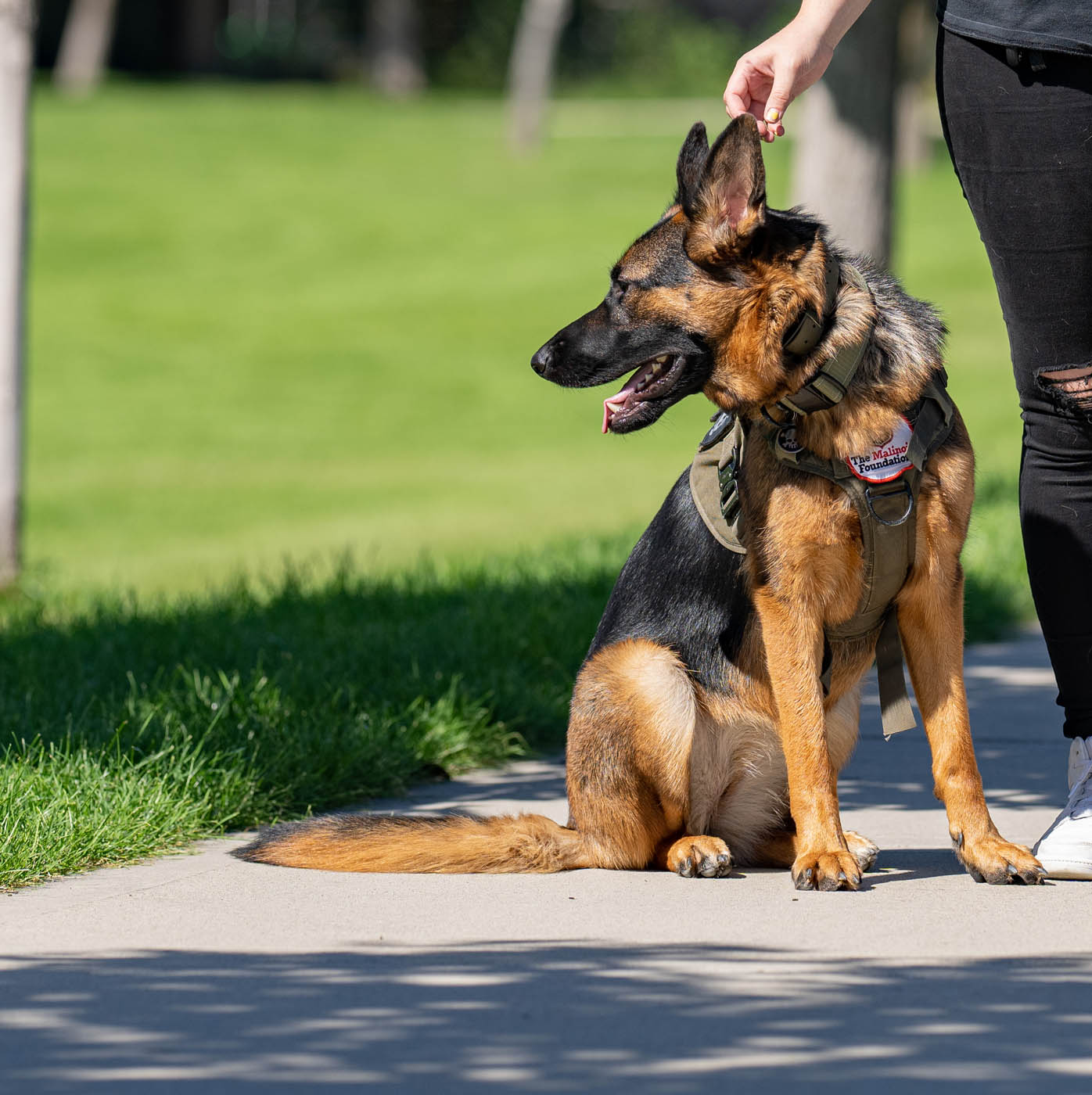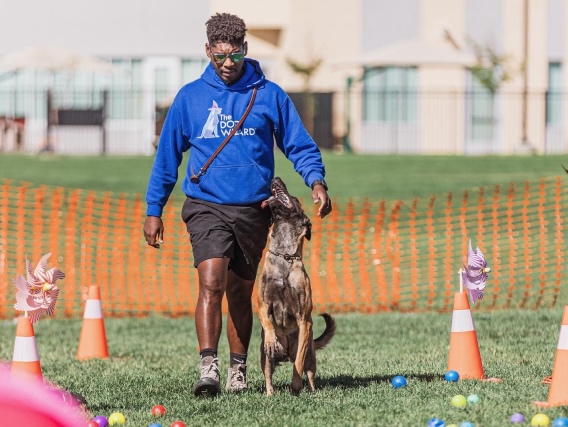Discovering Alternatives for Dog Training Charlotte: What You Required to Know
Discovering Alternatives for Dog Training Charlotte: What You Required to Know
Blog Article
Unlock Your Dog's Prospective: Proven Pet Training Methods for Success
Effective canine training is a nuanced process that rests on comprehending canine habits and employing clinically backed methods. dog training charlotte nc. By including favorable support, developing clear commands, and prioritizing socialization, dog proprietors can cultivate a productive relationship with their family pets. However, challenges frequently arise that need customized options and a person strategy. Checking out these proven approaches exposes not only the potential for behavior renovation however additionally the deeper bond that can be developed in between owner and canine. What crucial techniques must be taken into consideration to genuinely open your pet dog's potential?
Comprehending Canine Habits
Understanding pet dog behavior is vital for efficient training and fostering a favorable partnership in between dogs and their proprietors. A thorough understanding of canine body movement, articulations, and social interactions is critical for identifying their needs and emotions. Canines communicate mainly with non-verbal hints; as an example, a wagging tail might show exhilaration, while pinned ears can signal fear or submission.

In addition, ecological aspects play a considerable duty fit a pet's actions. Adjustments in regular, brand-new environments, or the presence of unknown people can result in anxiety or stress and anxiety in dogs. Identifying these triggers enables proprietors to mitigate unfavorable responses and create proper training strategies.
Inevitably, a deep understanding of canine behavior lays the structure for successful training methods, improving both behavior and the general bond between the dog and its owner. Dog training. This knowledge is vital for promoting a well-adjusted, delighted canine buddy
Favorable Reinforcement Techniques
Effective training counts heavily on favorable support techniques, which have actually been revealed to produce considerable lead to shaping preferred behaviors in canines. This approach entails rewarding a pet for showing details habits, therefore enhancing the chance that these habits will certainly be repeated. Benefits can take various types, consisting of treats, appreciation, playthings, or play, depending upon what encourages the private canine.

It is vital to slowly phase out rewards as the canine learns the behavior, transitioning to periodic reinforcement. This strategy keeps the actions gradually while protecting against reliance on constant incentives. By focusing on favorable reinforcement, instructors can grow a trusting partnership with their dogs, promoting a healthy and balanced and cooperative training setting that improves overall obedience and efficiency.
Developing Consistent Commands
An essential aspect of effective canine training is the establishment of consistent commands. Uniformity in commands is essential for reliable interaction between the instructor and the canine. When commands are consistent, pets discover to connect particular words with desired actions, which increases the training procedure and boosts understanding.
To develop his response consistent commands, it is necessary that all relative make use of the exact same terminology and motions. For example, if one individual utilizes "sit" while another states "take a seat," it can produce complication for the dog. Select clear, distinct words for commands and make certain everyone associated with the canine's training complies with these choices.
Strengthen commands through constant practice, making sure that the canine obtains enough possibilities to respond correctly. When a dog effectively adheres to a command, instant favorable support needs to follow.
Last but not least, be individual. Developing constant commands takes time and effort. With devotion and clarity, you will help your pet create a strong understanding of assumptions, eventually causing a mannerly companion.
Socialization and Direct Exposure
Mingling a dog is vital for cultivating a positive and well-adjusted friend. This process entails revealing your dog to a range of atmospheres, people, and various other animals to create their social abilities and versatility. Early socialization, preferably between the ages of 3 to fourteen weeks, is critical, as it prepares for a pet's future habits.
Throughout socialization, goal to supply positive experiences in various setups, such as parks, busy streets, and homes with other pet dogs. Present your dog to different stimuli, consisting of audios, views, and smells, ensuring that each experience is fulfilling. This exposure aids alleviate concern and anxiety, leading the way for a more durable pet.
Involving in regulated team play sessions with various other dogs can also improve social skills, educating your animal appropriate interactions and limits. Always monitor your canine's convenience level during these experiences, slowly raising direct exposure as their self-confidence expands. Keep in mind, the objective is to create a well-shaped pet dog that thrives in varied circumstances, advertising an unified relationship with both humans and other pets. Prioritizing socializing will substantially add to your pet's total happiness and actions throughout their life.
Conquering Common Educating Difficulties

Canines may struggle to focus in unfamiliar or busy setups. Gradually desensitize your dog to disturbances by starting training in a peaceful environment and gradually introducing even more stimuli as they become competent.
In addition, behavioral concerns like leaping or excessive barking can become aggravating. Address these by educating alternative habits, such as sitting calmly when welcoming visitors. Consistency and persistence are dog doing obstacle course crucial; strengthen desired behaviors consistently and stay clear of scolding, which can lead to confusion.
Finally, recognize that each canine is special, and training timelines might differ. Dressmaker your approach to your canine's private requirements, and seek professional support if essential. With perseverance and the appropriate strategies, getting over these difficulties can result in a trained, satisfied canine companion.
Conclusion
In final thought, unlocking a canine's prospective requires an extensive technique that incorporates an understanding of canine behavior, the application of positive reinforcement methods, and dog clicker pets at home the facility of constant commands. Early socialization and exposure to diverse settings additionally enhance a pet's flexibility and confidence. By dealing with typical training obstacles with tailored strategies and perseverance, a participating and unified connection in between pet dog and trainer can be cultivated, inevitably resulting in a mannerly companion qualified of flourishing in various scenarios.
Reliable pet training is a nuanced process that hinges on understanding canine actions and employing clinically backed techniques.Understanding canine actions is important for effective training and promoting a positive connection in between pet dogs and their owners.Effective training counts heavily on positive reinforcement techniques, which have been shown to generate significant outcomes in forming wanted habits in dogs. When commands are consistent, canines discover to associate specific words with wanted habits, which increases the training process and enhances understanding.
In conclusion, opening a canine's prospective requires a comprehensive approach that integrates an understanding of canine behavior, the application of positive reinforcement methods, and the facility of constant commands.
Report this page